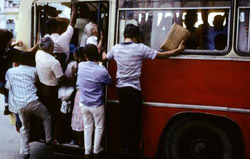Nowadays, we hear the expression “get the people ready”. This means that the international community understands that the last shelter of the Armenian and Azerbaijani officials is the unprepared condition of their own people.
So how should the presidents and ministers get the people ready? How much time do they need if the international community speaks about the conflict to be resolved this year? On the other hand how or for what are they going to prepare people if the people don’t even know what’s being discussed?
In 1997, former president of Armenia Levon Ter-Petrosyan tried to prepare people for the resolution, but he couldn’t do that because some political parties didn’t let him do that inside the country. Among the reasons that he failed to do this was the fact that people were unaware of the issues that were being discussed at the time. And later only after several years people learned that both the phase and package solution of the problem had the good and bad sides and that these good and bad sides would be solved during the negotiations that started on the basis of one of these two.
Now it is clear that neither the Azerbaijani nor Armenian authorities will do this (I know one thing, but I will not tell you that, but you should believe me) because this will make the people distrust the authorities more.
One of the ways that will help them to prepare people is to le the people know about the main principles of negotiations and then organize discussions, but the problem is that these authorities are not able to discuss matters with the people. They will try to gain benefits from the published information in order to prolong the period of their tenure.
The international community knows this very well and that is why they don’t let the parties publish the principles and results. So what do they understand by saying “getting ready”? What expectations do they have from the two presidents, one of which ordered to declare a demoralized murderer that pretended to show his aggressive side as the man of the year and the other one demonstrated a poor rally against Azerbaijan under the slogan of “No to Sumgait!”.
The reason why people are not prepared is not the fact that the leaders don’t speak about the necessity of peace, but the fact that in the periods before negotiations the information and terms that are published are not clear.
For example what will the Armenian and Azerbaijani people understand by “Refugees are to return to where they used to live”? Let’s try to imagine how it will happen. For instance Azerbaijan drives the former citizens of Khojalu, to the village which in fact does not exist. Then what? Then what are these people going to do in Karabakh? This means that this is not expressing any willingness to solve the problem; it is just a baseless idea that no one can imagine how will be realized after reaching an agreement. They left Khojalu during one night, but before that night there had been long days of fire and after that night, 14 years have passed. One generation has already been brought up in Karabakh without Khojalu and the former citizens of Khojalu. One generation of former citizens of Khojalu has been brought up without having any idea about where Karabakh is.
So what will the Azerbaijani and Armenian people understand by hearing “returning occupied territories”? Do they mean that the border line that these two states shared will be moved and changed during one day, one week or one month? Will the former citizens of Aghdam, Zangelan and others come and live in these territories or will the Armenian troops be replaced with Azerbaijani forces?
We can say the same regarding the occupation of Armenia too. After raising the blockade, will we go to Georgia through the short way of Ghazakh or will we prefer the safe way through Sadakhlo or Javakhk?
These questions remain unanswered. The answers are not going to be given by the “peace agreement” either. And the reason is not that the Armenian and Azerbaijani people are not tired of these long 18 years and don’t want peace, but the fact that they see danger in making solutions rapidly.
If the international community is hurrying to support the negotiations to reach peace in a short period this means that something is wrong in the East. And if everything is OK there, this means that the negotiating parties have to stop publishing news and start everything from zero, which is exactly what getting the people ready means.

